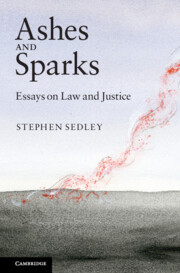Book contents
- Frontmatter
- Contents
- Preface
- Acknowledgements
- PART I History
- PART II Law
- 12 Justice miscarried
- 13 Breaking the law
- 14 Declining the brief
- 15 Big lawyers and little lawyers
- 16 Parliament, government, courts
- 17 Judges in lodgings
- 18 Mice peeping out of oakum
- 19 Justice in Chile
- 20 Never do anything for the first time
- 21 Rarely pure and never simple
- 22 Law and plumbing
- 23 The Laws of Documents
- PART III Justice
- Index
20 - Never do anything for the first time
Published online by Cambridge University Press: 05 June 2012
- Frontmatter
- Contents
- Preface
- Acknowledgements
- PART I History
- PART II Law
- 12 Justice miscarried
- 13 Breaking the law
- 14 Declining the brief
- 15 Big lawyers and little lawyers
- 16 Parliament, government, courts
- 17 Judges in lodgings
- 18 Mice peeping out of oakum
- 19 Justice in Chile
- 20 Never do anything for the first time
- 21 Rarely pure and never simple
- 22 Law and plumbing
- 23 The Laws of Documents
- PART III Justice
- Index
Summary
The Reform Club holds an annual lecture in memory of Lord Atkin, one of the few judges who has left an enduring mark on English law. Dauntingly, a dozen or more of his descendants (he had eight children) were in the audience when I gave the Atkin Lecture in November 2001. An attempt to say something not too solemn about precedent in the law, and something not too prickly about judicial activism, it has not been previously published except by the Reform Club as a booklet.
Professor Francis Cornford, whose Microcosmographia Academica sparked it off, held the Lawrence Chair of Ancient Philosophy at Cambridge which is now, by chance, occupied by my brother David. I acknowledge a debt not only to David's celebrated predecessor but – for the closing paragraphs of the essay – to my New Zealand colleague Ted Thomas.
There was once an activist judge. Following Professor Dworkin's lead, I will call him (though it could just as easily have been her) Prometheus J.
Prometheus J was walking by the river, so engrossed in thinking of new ways to make central government's life more difficult that he missed his footing and fell in.
A fellow judge, Sisyphus J, a distinguished constitutionalist, was walking in the opposite direction and saw him struggling in the water.
‘Good heavens,’ he said, ‘This calls for decisive action. Parliament must legislate at the first opportunity.’
Information
- Type
- Chapter
- Information
- Ashes and SparksEssays On Law and Justice, pp. 200 - 212Publisher: Cambridge University PressPrint publication year: 2011
